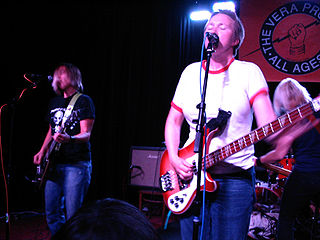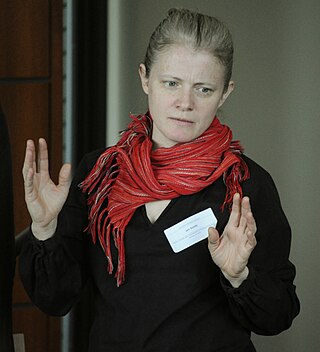Related Research Articles

Bikini Kill is an American punk rock band formed in Olympia, Washington, in October 1990. The group originally consisted of singer and songwriter Kathleen Hanna, guitarist Billy Karren, bassist Kathi Wilcox, and drummer Tobi Vail. The band pioneered the riot grrrl movement, with feminist lyrics and fiery performances. Their music is characteristically abrasive and hardcore-influenced. After two full-length albums, several EPs and two compilations, they disbanded in 1997. The band reunited for tours in 2019 and 2022, with Erica Dawn Lyle on guitar in place of Karren.
Queercore is a cultural/social movement that began in the mid-1980s as an offshoot of the punk subculture and a music genre that comes from punk rock. It is distinguished by its discontent with society in general, and specifically society's disapproval of the LGBT community. Queercore expresses itself in a DIY style through magazines, music, writing and film.

Kathleen Hanna is an American singer, musician and pioneer of the feminist punk riot grrrl movement, and punk zine writer. In the early-to-mid-1990s, she was the lead singer of feminist punk band Bikini Kill, and then fronted the electronic rock band Le Tigre in the late 1990s and early 2000s. Since 2010, she has recorded as The Julie Ruin.
Tobi Celeste Vail is an American independent musician, music critic and feminist activist from Olympia, Washington. She was a central figure in the riot grrl scene—she coined the spelling of "grrl"—and she started the zine Jigsaw. A drummer, guitarist and singer, she was a founding member of the band Bikini Kill. Vail has collaborated in several other bands figuring in the Olympia music scene. Vail writes for eMusic.

The port city of Olympia, Washington, has been a center of post-hardcore, anti-folk, and other youth-oriented musical genres since the late 1970s. Before this period, Olympia's The Fleetwoods had several Billboard chart successes between 1959 and 1963. Olympia saw a rise in feminism in the music industry, where artists commonly addressed rape, domestic abuse, sexuality, racism, patriarchy, classism, anarchism, and female empowerment in their songs. It was a center for the riot grrrl movement of the early 1990s, which featured Bikini Kill and Bratmobile.

Julie Ruin is the debut solo album by Kathleen Hanna, released on September 29, 1998, through Kill Rock Stars. She recorded the album in 1997 whilst taking a break from Bikini Kill. Hanna recalled:
[It] was made as Bikini Kill was in breaking up, a guy who worked across the street from my apartment building was stalking me and I was being treated, in my own community, like a historical oddity. The solo record helped me remember that I was just a fucking person who liked being creative.

Team Dresch is an American punk rock band originally formed in 1993 in Olympia, Washington.
Sister George were an English band from London, recognised as being significant in the 1990s queercore scene, who formed in 1993.
Sta-Prest was a multi-racial queercore and riot grrrl band from San Francisco that was active in the 1990s. The group members included Aloofah and D.M. Feelings.

Tammy Rae Carland, is a photographer, video artist, zine editor, current provost at California College of the Arts (CCA), and former co-owner of the independent lesbian music label Mr. Lady Records and Videos. Her work has been published, screened, and exhibited around the world in galleries and museums in New York, Los Angeles, San Francisco, Berlin, and Sydney.
Donna Dresch is an American punk rock musician, perhaps best known as founder, guitarist and bass guitarist of Team Dresch.

Rachel Carns is an American musician, composer, artist and performer living in Olympia, Washington, U.S. Raised in small-town Wisconsin, she went on to study painting and drawing at Cooper Union for the Advancement of Science and Art in New York City, where she completed her B.F.A. in 1991. Carns began her career as drummer for Kicking Giant, later collaborating with several bands, including The Need. She is a celebrated graphic designer, working under the name System Lux, and plays drums and percussion with experimental performance art group Cloud Eye Control.

Jen Smith is an artist, musician, zine editor, and activist from the United States. Smith is credited with being the inspiration behind the term riot grrrl and being one of the architects of the movement.
Sini Anderson is an American film director, producer, performance artist, choreographer, dancer and poet, from Chicago, Illinois. Anderson is widely known for directing The Punk Singer (2013), a documentary about riot grrrl musician Kathleen Hanna's legacy and experience with late-stage Lyme disease.
Skinned Teen was a riot grrrl band from London, England, active in the early 1990s. They have been cited as an inspiration by Beth Ditto, Kathleen Hanna, Gina Birch and Josephine Olausson of Love Is All.
Riot grrrl is an underground feminist punk movement that began during the early 1990s within the United States in Olympia, Washington, and the greater Pacific Northwest, and has expanded to at least 26 other countries. A subcultural movement that combines feminism, punk music, and politics, it is often associated with third-wave feminism, which is sometimes seen as having grown out of the riot grrrl movement and has recently been seen in fourth-wave feminist punk music that rose in the 2010s. The genre has also been described as coming out of indie rock, with the punk scene serving as an inspiration for a movement in which women could express anger, rage, and frustration, emotions considered socially acceptable for male songwriters but less commonly for women.

The Punk Singer is a 2013 documentary film about feminist singer Kathleen Hanna who fronted the bands Bikini Kill and Le Tigre, and who was a central figure in the riot grrrl movement. Directed by filmmaker Sini Anderson and produced by Anderson and Tamra Davis, the film's title is taken from the Julie Ruin song "The Punk Singer", from Hanna's 1998 solo effort.

Women have made significant contributions to punk rock music and its subculture since its inception in the 1970s. In contrast to the rock music and heavy metal scenes of the 1970s, which were dominated by men, the anarchic, counter-cultural mindset of the punk scene in mid-and-late 1970s encouraged women to participate. This participation played a role in the historical development of punk music, especially in the US and UK at that time, and continues to influence and enable future generations. Women have participated in the punk scene as lead singers, instrumentalists, as all-female bands, zine contributors and fashion designers.
Ramdasha Bikceem is an American writer, singer, and musician. She published the pioneering riot grrrl zine GUNK in the early 1990s, which explored intersections of race and gender in punk and skateboarding.
References
- 1 2 3 "Featured Work: Bikini Kill in the UK: It Changed My Life (1993, Lucy Thane)". Cinenova . Retrieved 11 November 2020.
- 1 2 3 4 "Bio". Lucy Thane. 16 March 2016. Retrieved 11 November 2020.
- ↑ "Guide to the Lucy Thane Riot Grrrl Collectionca. 1993-1995 MSS.287". New York University Digital Library. Retrieved 13 November 2020.
- 1 2 3 4 "Someone Said Rebel Boy: Lucy Thane & Bikini Kill in the UK". Impose . 12 May 2016. Retrieved 11 November 2020.
- 1 2 "Spectacle's 'Grrrl Germs' Film Series Captures the Agony, Ecstasy, and Diversity of Riot Grrrl". The Village Voice. 16 May 2016. Retrieved 11 November 2020.
- ↑ Davis, Petra (28 January 2013). "Black Sky Thinking - Riot Grrrl: A 20 Year Retrospective By Petra Davis". The Quietus. Retrieved 12 June 2023.
- ↑ "Reviews: Bikini Kill". The Quietus. Retrieved 11 November 2020.
- ↑ "Adding Context: The Lucy Thane Riot Grrrl Videos – The Back Table". Archives and Special Collections at New York University. Retrieved 11 November 2020.
- ↑ Miller, Jenni (26 November 2013). "Director's Cut: Sini Anderson on 'The Punk Singer'". MTV (Interview). Archived from the original on 12 June 2023. Retrieved 12 June 2023.
- ↑ Hardwick, Dakin (5 December 2013). "Spinning Platters Interview: Director Sini Anderson of "The Punk Singer"". spinningplatters.com (Interview). Retrieved 12 June 2023.
- ↑ Frameline Film Festival 1998 catalog. Frameline Film Festival. Archived 2007-04-10 at the Wayback Machine
- ↑ Kearney, Mary Celeste (2006). Girls Make Media. Routledge. ISBN 0-415-97278-7.
- ↑ Console-ing Passions Abstracts from Tulane University. Tulane University. Archived 2007-05-18 at the Wayback Machine
- ↑ Syllabus from University of Kansas Women's Studies course. University of Kansas. Archived 2 September 2006 at the Wayback Machine
- ↑ "Buy cinema tickets for The Punk Singer". BFI. Retrieved 11 November 2020.
- ↑ "She's Real Worse than Queer (1997)". BFI. Archived from the original on 1 August 2021. Retrieved 11 November 2020.